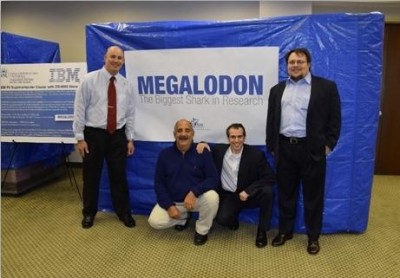NSU Newsroom
SharkBytes
Horizons
This version of NSU News has been archived as of February 28, 2019. To search through archived articles, visit nova.edu/search. To access the new version of NSU News, visit news.nova.edu.
This version of SharkBytes has been archived as of February 28, 2019. To search through archived articles, visit nova.edu/search. To access the new version of SharkBytes, visit sharkbytes.nova.edu.
Nova Southeastern University Will Ramp Up Research with its First Supercomputer

The Megalodon Supercomputer at Nova Southeastern University, with NSU’s Eric Ackerman, Ph.D., and IBM’s Dore Teichman, Graig Oteri and Gregory Mussich
FORT LAUDERDALE-DAVIE, Fla.– February 26, 2014 –
Nova Southeastern University’s (NSU) Graduate School of Computer and Information Sciences has received a multimillion dollar IBM (NYSE: IBM) Supercomputer that will place NSU’s research at the forefront of computational biology, data mining, graphic visualization and software engineering.
“The addition of the supercomputer allows NSU to join an elite group of universities with this type of research computing power,” said NSU President George L. Hanbury, Ph.D. The supercomputer was donated by Centaurus Energy of Houston, Texas.
Classified as an institution with “high research activity” by the Carnegie Foundation for the Advancement of Teaching, NSU has more than 200 research projects currently underway and the acquisition of the supercomputer will play an important role in extending NSU’s research capabilities. The supercomputer will allow university researchers to create more accurate models of complex processes, and simulate problems that currently cannot be addressed with the university’s existing systems.
“This IBM Supercomputer will allow researchers to analyze increasing amounts of data generated by experiments in weeks or months, rather than the years required by conventional computers,” said Eric S. Ackerman, Ph.D. Dean of NSU’s Graduate School of Computer and Information Sciences. “It will also allow NSU to develop a new wave of graduates who will have skills in large-scale computing, making them even more desirable prospects in the increasingly competitive job market.”
The machine cluster is a collection of 32 nodes with each node having 16 POWER CPU’s with 256 GB of RAM. Each CPU has two processor units that can run two threads each. Each core is capable of two-way simultaneous multithreading. Each CPU has approximately 790 million transistors. Each core has two integer units, two binary floating-point units, an AltiVec unit, and a novel decimal floating-point unit. It also has hardware support for IEEE 754 decimal arithmetic and includes the first decimal floating-point unit integrated in silicon. The machine is water-cooled using internal chilled plates and a rear cooling door on each rack.
The software stack consists of AIX, General Parallel File System (GPFS), C++, Fortran, IBM Parallel Environment Runtime (PE), Engineering and Scientific Subroutine Library (ESSL), Parallel Engineering and Scientific Subroutine Library (PESSL), and Tivoli Workload Scheduler LoadLeveler.
In keeping with the university’s mascot theme, the Sharks, the IBM Supercomputer has been nicknamed “Megalodon” the largest prehistoric shark known to man. Megalodon is currently housed within NSU’s Graduate School of Computer and Information Sciences and will be moved to the university’s $80 million Center for Collaborative Research, once the facility is completed in 2016.
For more information on NSU’s supercomputer, visit http://scis.nova.edu/megalodon.html.
For more information on NSU’s Center for Collaborative Research, visit https://nsunews.nova.edu/nova-southeastern-university-to-build-80-million-research-facility-2/
###
About NSU’s Graduate School of Computer and Information Sciences (GSCIS): The GSCIS provides educational programs of distinction to prepare students for leadership roles in the computer and information sciences field. With internationally recognized faculty, innovative curricula, and flexible online and campus-based formats for its five Master of Science, three Ph.D. and three certificate programs – the GSCIS’s graduates are sought after around the world. Designated a National Center of Academic Excellence in Information Assurance Education, their information assurance curriculum is recognized by the National Security Agency and the Department of Homeland Security. For more information, please visit www.nova.edu/scis.
About Nova Southeastern University: Situated on 314 beautiful acres in Ft. Lauderdale, Florida, Nova Southeastern University (NSU) is a dynamic fully accredited research institution dedicated to providing high-quality educational programs at all levels. NSU is a not-for-profit independent institution with 27,000 students. NSU awards associate’s, bachelor’s, master’s, specialist, doctoral and first-professional degrees in a wide range of fields. NSU is classified as a research university with “high research activity” by the Carnegie Foundation for the Advancement of Teaching, and it is one of only 37 universities nationwide to also be awarded Carnegie’s Community Engagement Classification. For more information, please visit www.nova.edu. Celebrating 50 years of academic excellence!
Media Contact:
Felecia Henderson, Ed.D | Office of Public Affairs
954-262-5315 (office)
954-383-4695 (cell)
fhenders@nova.edu